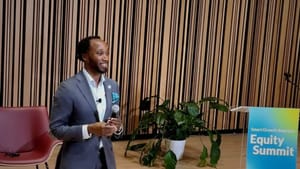Inject more of this urbanism energy into me, please. I just wrapped up the Smart Growth America Equity Summit, and while my introverted social battery is drained, my advocacy engine is at full power. The event featured incredible speakers with powerful advice and emotional stories. Here are some highlights I picked up from the past two days on building real change:
SGA's President & CEO, Calvin Gladney, opened the summit by addressing the "elephant in the room"—the anger, sadness, and fear around the dismantling of federal government, the nonprofit sector, and cities. His message? We can’t play “whack a mole.” Instead, we must prioritize efforts and survive to seize the opportunity to "build back different," creating new processes and programs to avoid past mistakes which hindered us.
Jerusalem Demsas delivered a fiery keynote, criticizing both the illiberal right for attacks on immigrants and trans communities and Democratic leaders for failing to combat the housing affordability crisis driving voters to the GOP. She highlighted how "blue" states perpetuate the housing crisis through bureaucracy, while "red" states grow by embracing rapid development. Her advice was simple: equity is impossible amidst scarcity. If you pit equity against development, equity loses. Those focusing on redistribution without growth will fail.
The "Federal, State, and Local Advocacy" panel moderated by John Robert Smith really stood out with his thoughtful introductions of each panelist. Panelist Sarah Brundage emphasized the risks of privatizing federal functions, noting that affordable housing requires public-private partnerships to work, and eliminating those public partners will result in greater inequality. Republican Mayor of Clearfield City, Utah, Mark Shepherd, offered insights into messaging in deeply conservative communities, advocating for avoiding divisive language and framing policies as benefitting resident's children while openly confronting NIMBYs regarding their harmful policies.
My takeaway: We absolutely must rebuild messaging, processes, and coalitions. While best practices and existing coalitions remain important, we need to focus aggressively on big, bold goals and operate from a clean slate when necessary. The past is the past and was too timid for our needs anyway.
More notes and insights are in my Bluesky thread from the event, with it shared to LinkedIn, also.

